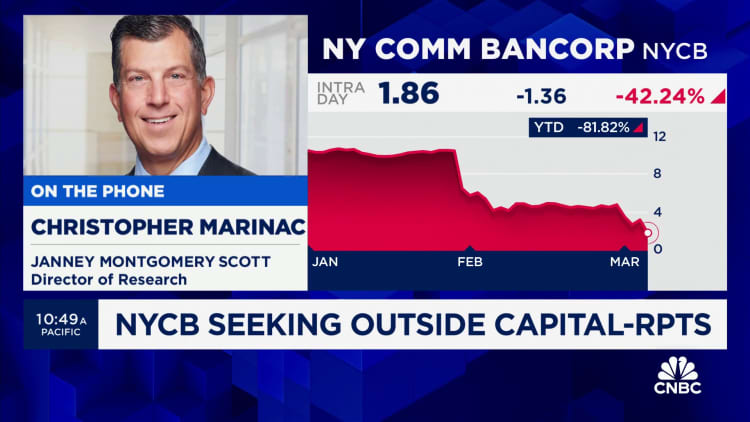Why private equity has been involved in every recent bank deal

[ad_1]
Federal Reserve Chair Jerome Powell fist-bumps former Treasury Secretary Steven Mnuchin after a House Financial Services Committee hearing on “Oversight of the Treasury Department’s and Federal Reserve’s Pandemic Response” in the Rayburn House Office Building in Washington, D.C., on Dec. 2, 2020.
Greg Nash | Reuters
The $1 billion-plus injection that New York Community Bank announced Wednesday is the latest example of private equity players coming to the need of a wounded American lender.
Led by $450 million from ex-Treasury Secretary Steven Mnuchin’s Liberty Strategic Capital, a group of private investors are plowing fresh funds into NYCB. The move soothed concerns about the bank’s finances, as its shares closed higher on Wednesday after a steep decline earlier in the day.
That cash infusion follows last year’s acquisition of PacWest by Banc of California, which was anchored by $400 million from Warburg Pincus and Centerbridge Partners. A January merger between FirstSun Capital and HomeStreet also tapped $175 million from Wellington Management.
Speed and discretion are key to these deals, according to advisors to several recent transactions and external experts. While selling stock into public markets could theoretically be a cheaper source of capital, it’s simply not available to most banks right now.

“Public markets are too slow for this kind of capital raise,” said Steven Kelly of the Yale Program on Financial Stability. “They’re great if you are doing an IPO and you aren’t in a sensitive environment.”
Furthermore, if a bank is known to be actively raising capital before being able to close the deal, its stock could face intense pressure and speculation about its balance sheet. That happened to Silicon Valley Bank, whose failure to raise funding last year was effectively its death knell.
On Wednesday, headlines around noon that NYCB was seeking capital sent its shares down 42% before trading was halted. The stock surged afterward on the news that it had successfully raised funding.
“This is the unfortunate lesson from SVB,” said an advisor on the NYCB transaction. “With private deals, you can talk for a while, and we almost got to the finish line before there was any publicity.”
Mnuchin’s outreach
Mnuchin reached out to NYCB directly to offer support amid headlines about the duress it was under, according to a person with knowledge of the matter. Mnuchin isn’t just a former Treasury secretary. In 2009, he led a group that bought California bank IndyMac out of receivership. He ultimately turned the bank around and sold it to CIT Group in 2015.
Now, with the assumption that Mnuchin and his co-investors have seen NYCB’s deposit levels and capital situation — and are comfortable with them — the bank has much more time to resolve its issues. Last week, NYCB disclosed “material weaknesses” in the way it reviewed its commercial loans and delayed the filing of a key annual report.
“This buys them a ton of time. It means the FDIC isn’t coming to seize them on Friday,” Kelly said. “You have a billion dollars in capital and a huge endorsement from someone who has seen the books.”
Don’t miss these stories from CNBC PRO:
[ad_2]